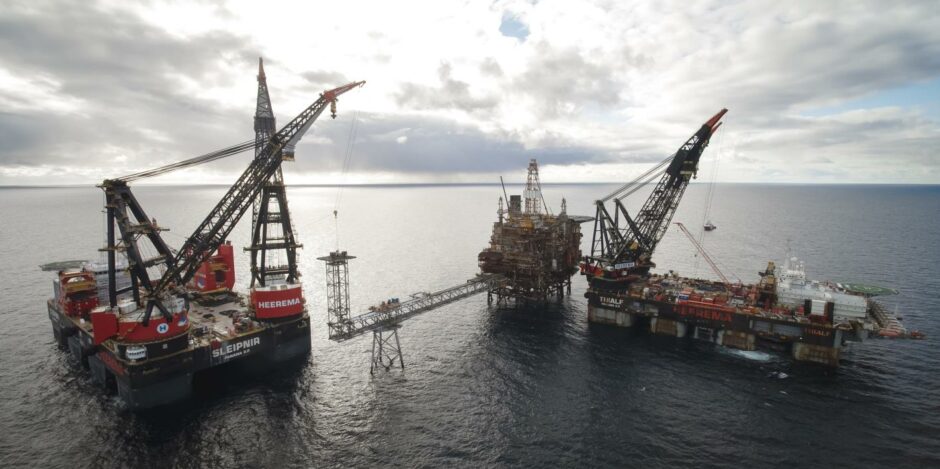Glasgow has played host to the world’s “last best chance” to tackle the climate emergency.
The debate will continue on whether the commitments made by governments around the world at the COP26 summit can deliver on the target of limiting global warming to 1.5 degrees.
But there is no doubt Scotland is now globally synonymous with green economic transition and transformation.
Right across the energy eco-system, Scottish-based businesses are developing technology and sustainable solutions to create a zero-carbon world.”
Against a backdrop of extreme weather events witnessed across the globe, as well as turbulent geopolitics, rising tensions, gas shortages, rising energy prices and energy storage issues, COP26 was a decisive point for governments to come together and avert devastating climate change.
Delivering the climate change commitments agreed at COP26 will not just be the responsibility of governments.
Tackling what is the greatest challenge to humanity needs business, education and citizens to collaborate, adapt and invest.
Developed nations have heard the calls of the “Global South” and promised billions in investment to support developing countries in reaching net-zero.
In the UK, the Climate Change Committee suggests that by proactively tackling climate change, the investment required per year to reach net-zero emissions “could cost less than 1% of GDP (gross domestic product) every year through until 2050”.
By comparison, the UK defence budget is 2% of GDP each year.
The investment figures may initially be substantial, but as green technology evolves and develops the costs will be reduced – making the transition more affordable.
‘Everyone has a role to play’
While tackling climate change may almost seem like too big a problem or indeed “someone else’s problem” everyone has a role to play.
Scottish businesses and entrepreneurs are proactively tackling climate change.
Right across the energy eco-system, Scottish-based businesses are developing technology and sustainable solutions to create a zero-carbon world.
Whether promoting the circular economy by harnessing artificial intelligence and data to monitor the environmental and carbon impact of industrial waste, decarbonising oil and gas production, or developing an app to measure individual and company carbon footprints, Scotland has the ideas, innovation and technology to help the world.
Scotland has a long-standing heritage as an energy engineering pioneer, from the development of hydropower and the extraction of oil and gas to the more recent harnessing of offshore wind and tidal energy.
Born out of the complex challenges posed by connecting remote areas of the country to the national grid or sourcing energy in the harshest of environments such as the North Sea or Pentland Firth, Scotland’s energy expertise continues to evolve as the energy landscape changes.
Fossil fuel challenge
Reducing emissions from fossil fuels is a key priority to ensure global net-zero is met by 2050.
As one of the most mature basins in the world, the North Sea has witnessed incredible technological advancements to drill deeper, increase recovery and improve cost efficiencies.
As the energy transition unfolds, the main engineering challenges for the North Sea are decarbonisation of production and decommissioning.
Collaboration in action
Decommissioning is a prime example of harnessing collective knowledge, expertise and data across the energy ecosystem to develop effective solutions.
Supported by third-party organisations such as the UK and Scottish Government-funded Net Zero Technology Centre (NZTC), energy companies are making the progress required and at pace through partnerships with other organisations and educational institutions.
This approach of co-funded partnerships between the public and private sector, and the vision of working cross-sector to co-create an integrated energy future is already reaping benefits.
NZTC is driving and encouraging innovation to support the development of renewables and energy storage, as well as hydrogen and other clean fuels, and carbon capture, utilisation and storage.
It’s an approach that will only become more commonplace as the race against climate change continues.
Scotland’s hosting of COP26 acknowledged our decades of energy engineering expertise and commitment to leading the transition to a net-zero world.
Scottish businesses are already acting and developing innovative solutions to tackle climate change and have a role to play in keeping the momentum from COP26 alive.
The Scottish Chambers of Commerce network is leading the way by organising an energy-focused delegation to the Dubai World Expo in January 2022.
The Dubai Expo offers Scotland’s businesses a perfect opportunity to highlight our talent and skills, as well as connect people from all over the world to showcase our world-leading innovation and technology.
Some of the world’s most advanced technology will be on show, which makes it the ideal stage for Scottish innovation.
This delegation will help Scottish businesses re-establish vital international business connections and discover valuable new opportunities to showcase their skills, expertise and innovation.
This opportunity to take Scotland to the world will also allow businesses to rise to the climate change challenge, help make the commitments from COP26 a reality and build long-lasting trade relationships with partners around the world.
Liz Cameron is chief executive of the Scottish Chambers of Commerce.




